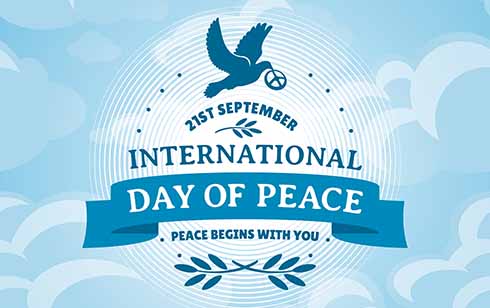 The International Day of Peace (21 September) is always timely. Unfortunately so. There is no end to wars and disputes between nations and between groups within them that take lives, devastate towns and impoverish nations.
The International Day of Peace (21 September) is always timely. Unfortunately so. There is no end to wars and disputes between nations and between groups within them that take lives, devastate towns and impoverish nations.
Peace is something that everyone wants, but most wars begin when one group or another tries to impose peace on its own terms. To build peace you need to go further back and ask those who claim to want peace what they are willing to do, and what interests they are prepared to sacrifice, in order to build it. A test of their seriousness might be to ask what they are willing to do to support the people destroyed by wars in which their own nations have been involved.
Most wars are fought in order to make peace – sometimes to impose peace by winning the war, often to force an aggressive nation or group to accept the terms on which peace can be built, and sometimes to assert control over the peace that will follow. Leaders of most nations describe themselves as peace loving and their enemies as violent aggressors.
LACK OF MUTUAL TRUST
In this lack of mutual trust, war is the natural result. Fear and suspicion lead nations to enlarge their armies and stockpiles of deadly weapons, enlarge their capacity to manufacture weapons, recoup the cost by selling weapons to other nations and armed groups with which they are conveniently allied, and join in military adventures their strong allies initiate.
The result for the unfortunate people who are the victims of this cycle is that they live in fear of war, are driven from their homes, become refugees in their own or in another land and are deprived of basic human rights. They are then excluded, and their need ignored, by the nations that participate in their destruction directly or through their proxies.
The cost of war-making is enormous, both directly for the people whose lives it takes or ruins and indirectly for the nations engaging in it. It multiplies distrust and alienates resources that could better be spent positively on peacemaking through aid to impoverished peoples and to healing the wounds of war. And it unites nations in fear as they seek allies against common and enemies.
INTERNATIONAL CHALLENGE
All this is the gloomy background to International Peace Day. As in so many international challenges it suggests how important are the personal and communal relationships that are the building blocks of national policies. The rage and suspicion that we see in war making are bred in the violence of family relationships, the choice we make between hatred or understanding in our social media postings, the vituperation of political discourse, the ways in which playground fights are handled and learned from, and how we handle frustration on the roads and in shopping centres.
Peace begins in the negotiation of differences through apologies and reconciliation in personal relationships and in the learning of other ways of response than lashing out.
International Peace Day looks at the largest possible canvas. Peace making begins in the most intimate of relationships and the learning of the simplest of formulae: please, sorry, thank you.